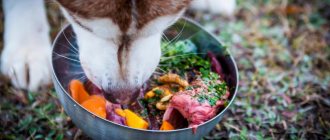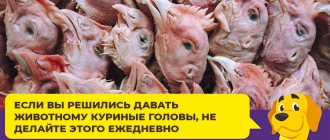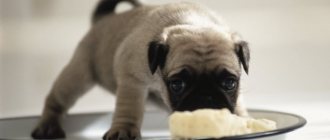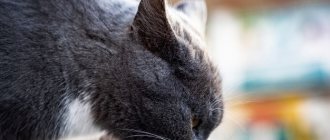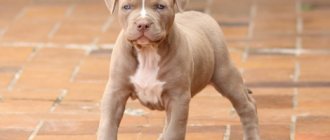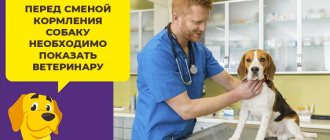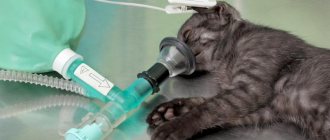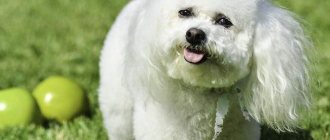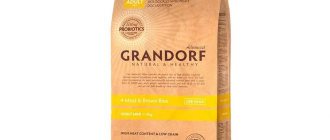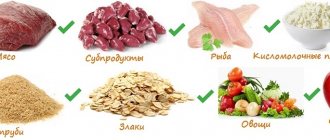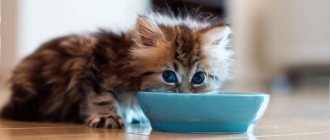Neutering is a standard procedure for dogs whose owners do not intend to include them in a breeding program. If you do not want your pet to have puppies, it is advisable to consult a veterinarian. Castrated (sterilized) dogs become calmer, more obedient, and are not nervous about hormonal changes that negatively affect their health. The animal makes contact with its owners more easily and is generally happier and lives longer.
However, the hormonal background, metabolism and condition of the dog’s body changes greatly after sterilization. The owner must take this into account, adjust the pet’s lifestyle - and, above all, we are talking about nutrition. In this article we will tell you how food for sterilized dogs differs, why it is needed, and give examples of successful, safe and nutritious diets.
Why do you need to switch your dog to special food after sterilization?
Sterilization, or castration, involves surgically disrupting the original functioning of a dog's reproductive organs. The operation will not just eliminate the risk of pregnancy - it will change the course of metabolic processes. The reproductive system is “responsible” for the work of many hormones, which affects the body as a whole. After sterilization, the vast majority of dogs:
- become less restless - the constant stress associated with the “call of nature” goes away, so the dog is less nervous;
- they move less - the desire to find a partner becomes much less, a calm animal often walks at a measured pace rather than running around the park;
- changes eating habits - the dog may become more picky about food (this happens more often with castrated males than with females).
Due to a combination of factors, neutered dogs begin to gain weight quickly and their digestion becomes more sensitive. If the energy value and composition of the food are not changed, the pet may develop obesity and problems with the gastrointestinal tract will begin. Excess weight threatens heart disease, joint disease, shortness of breath and other serious troubles. Therefore, immediately after the operation, the animal must be gradually transferred to food for sterilized dogs.
It is advisable that the diet be selected by a doctor. He knows about the physiological characteristics of small and other breeds, and will be able to take into account the health status and preferences of your dog. But you can choose the food yourself. The only thing: it is undesirable to give your dog only natural food. Even an experienced owner will not be able to take into account all the requirements for the vitamin and mineral composition or scrupulously calculate the required number of calories. Most breeders and veterinarians recommend feeding neutered dogs a prepared, specialized diet - best if it is dry. If desired, it can be supplemented with wet canned food or natural food.
Why you need to change your diet after surgery
It is advisable to perform the castration and sterilization procedure if there is no need to reproduce a pet. This makes the animal calmer, behavioral instincts are smoothed out, and the likelihood of developing malignant tumors is significantly reduced. After surgery, your pet’s body stops producing sex hormones.
Neutered dog after surgery
Due to hormonal changes, the animal’s physical activity decreases and fat accumulates faster. After the operation, sexual interest is lost, and at the same time the dog enjoys eating.
Note! If the dog is accustomed to eating large portions, then the volume cannot be reduced; it will experience a constant feeling of hunger.
What are the features of food for sterilized dogs?
Specialized food - granules or croquettes with a professionally selected ratio of proteins, fats and carbohydrates and a vitamin-mineral complex to maintain the health of a neutered dog. A distinctive feature of all such diets is their lower energy value (calorie content) compared to regular food. This allows a dog whose activity has decreased to remain in healthy physical condition and not gain weight.
Due to the lower caloric content of the diet, it is important to ensure that your pet is eating enough. To do this, feed manufacturers regulate the proportion of animal protein (protein) in them and process raw materials in a special way to maintain maximum nutritional value. Therefore, a high-quality dry diet is completely absorbed, easily digested and saturates the pet well.
Animal protein should be lean - chicken, turkey, lean red meat, fish, high-level organ meats. To meet protein quality requirements, you need to choose food for sterilized dogs of at least a premium class, and preferably super-premium. They contain a lot of protein (on average, about 30% or more), there are few by-products and they belong to the highest category - heart, liver. Animal protein provides a neutered dog with energy and amino acids vital for health.
Also in the “special food” the proportion of animal fats is reduced. In food for sterilized dogs, they are often replaced with fish oil and oils high in beneficial polyunsaturated acids (Omega and its varieties - ALA, EPA and DHA). A dry special diet, as a rule, contains 8-10 g of fat per 100 g of weight. L-caritinine, a substance that normalizes metabolism, is often added to such foods. It improves the process of burning fat in the dog's body and prevents obesity.
Also added to diets for sterilized (castrated) animals:
- “Slow” complex carbohydrates - grains, legumes, starchy vegetables. They give a feeling of fullness with less calorie content. If your pet has sensitive digestion or a tendency to allergies, it is advisable that the diet be gluten-free or grain-free. These foods for sterilized dogs do not contain wheat, corn, or soy.
- Vegetable oils. The lipids from them, like fish oil, are very necessary for the dog. They maintain the health of the nervous system, regulate the distribution of energy received from food throughout the body, and improve the condition of the coat and skin.
- Cellulose. It improves intestinal motility, which is important when switching a dog to a low-fat diet. Dogs aged 10-12 years especially need fiber - it solves their problems with stool.
- Additional components. Herbs that are useful for castrated animals include alfalfa, burdock, and chicory root. Fruits and berries in special food for sterilized dogs are a source of antioxidants that prolong active age.
Review of ready-made food with characteristics
There are many brands of dog food in pet stores, veterinary clinics, and online trading platforms. Manufacturers offer granules, canned food, pates, meat pieces in their own juice and other types of food for sterilized four-legged pets. Before purchasing dry or wet food with a reduced fat and carbohydrate content, you need to consult a veterinarian and take into account recommendations for choosing nutrition. The package must bear the inscription Sterilized.
Dry
The best brands and varieties:
- Akana Light.
- Canide Platinum.
- Go.
- Orijen.
- Earthborn Holistic Dog Weight Control.
- Club 4 Paws.
- Purina Proplan.
- Hills.
- Eukanuba (Sterilized Dogs and Daily Care Overweight species).
- Royal Canin (Neutered Adult Small Dog line).
Wet
High-quality food for sterilized dogs:
- Royal Canin.
- Morando.
- NATURE'S PROTECTION.
- BARKING HEADS.
- LOVELY HUNTER.
- Hills.
- ALMO NATURE.
- BERKLEY Happy Dog.
Premium class
Hills and Purina companies offer premium light food with a reduced content of carbohydrates and fats for small breed dogs, including those after 7 years. It is important to choose an improved premium class rather than the cheapest varieties. Royal Canin also offers Neutered Adult at an affordable price for dogs with slow metabolisms. At the best price, you can buy dietary food from the premium category.
On a note! Premium food for neutered dogs is not the best option for a daily diet. There is little natural meat, there are flavors, offal, and food additives. Inexpensive types of dry and wet food are allowed only as a temporary measure. It is better not to use cheap varieties (economy class) for feeding dogs, regardless of age and breed.
Super premium class
Elite food for pets after spaying and neutering is an excellent option for maintaining the health of small dogs. Many well-known manufacturers offer super premium food lines with a low percentage of fat and easily digestible carbohydrates.
Veterinarians advise feeding a low-active animal with dry and wet types of food of the following brands:
- Kanida.
- Akana.
- Go.
- Orijen.
Dog owners will find among the products of well-known companies grain-free lines for dogs with allergies and poor gluten tolerance. Elite varieties do not contain synthetic flavors or products that are difficult for the stomach. Carbohydrates are represented by oats, which provide energy and are easily digestible. The amount of fat is reduced to 10–11%, there is a useful component of L-kartinin, medicinal herbs, and ground seaweed.
Vitamins and minerals in food for sterilized dogs
A vitamin-mineral complex must be added to food for sterilized dogs. It is often selected taking into account the breed and health characteristics of the animals. For example, vitamins and prebiotics are added to diets for small dogs to reduce intestinal sensitivity and additionally exclude beets and legumes. Miniature pets are often intolerant.
Calcium is added to diets for large breeds to strengthen bones, plus D3 and other vitamins that increase the absorption of the microelement. Medium-sized dogs need a balanced lipid composition - their food is enriched with omega 3 and 6 acids.
If your pet has underlying health problems, choose a diet that contains:
- taurine - it is useful for diseases of the heart and joints;
- kaolin and brewer's yeast - they also normalize heart function and, thanks to the content of B vitamins, improve the condition of the intestines and coat;
- calcium sulfate and other nutrients that make urine pH less alkaline - this is important if you are prone to or have urolithiasis.
It is worth remembering: not only food for sterilized dogs, but also ready-made diets for weight control meet the requirements for calorie content, fat content and nutrients useful for sensitive digestion. They can also be given to a neutered pet if he does not like the special food. Dietary foods do not irritate the sensitive gastrointestinal tract and do not cause allergies. They are suitable as the only source of energy for every day.
To make it easier for you to choose a dry diet for your pet, below is an overview of popular, successful foods for sterilized dogs.
Diet selection
Any dog belongs to a certain breed. They are divided into sizes and categories. When choosing food, you need to take into account the characteristics of your pet. The food should satisfy him and not cause hunger and obesity.
For large breeds
Each manufacturer produces a separate category of food for large breeds. Its main difference is the size of the croquettes. Large animals find it difficult to chew small pieces. A suitable value has been selected for them. Protein in food should be at least 25%.
You can choose any composition: with a high content of vitamins, probiotics, vegetables. If the dog is active, then you need to take into account that it spends a lot of energy every day. Therefore, nutrition should be balanced.
For medium breeds
Pet food companies recommend using food for neutered medium breed dogs. They have the necessary balance of all components. It is also necessary to pay attention to the age of the dog. Upon reaching the age of 7 years, their diet is changed.
Expert opinion
Anna Abramenko
An avid dog lover. Experience in veterinary medicine since 2009.
Ask a Question
You should not switch your animal to new food immediately after sterilization. They get used to it gradually. Otherwise, the dog will refuse to eat it. It is better to add new food to the old food in small portions, gradually increasing its quantity.
The best foods suitable for neutered dogs
Farmina Vet Life Neutered
A well-known European company produces food that helps control weight and, thanks to the content of isoflavones, reduces the effects of sex hormones on metabolic processes. The diet is suitable for adult and elderly neutered dogs (recommended age - 1+) regardless of breed.
Features of the food:
- the presence of L-caritinin and a limited amount of fat for weight control - to keep the dog full, the food contains an increased content of plant fibers;
- prevention of urolithiasis and heart pathologies - contains calcium sulfate and taurine;
- a lot of crude protein - 33%.
Royal Canin Vet Neutered Adult Dog
One of the most popular diets for medium-sized dogs (11 to 25 kg) aged 1 year and older. Low in calories and high in fiber, making it good for weight control. At the same time, the croquettes are very satiating as they contain the highly digestible LIP protein.
Features of the food:
- suitable for dogs with hypersensitive skin, maintains the beauty of the coat, as it contains fish oil;
- protects the digestive system with Neutered complex and chicory extract;
- contains antioxidants - vitamin E, lutein, ascorbic acid.
Pro Plan Adult Light/Sterilized All Size
This food for sterilized dogs contains a special OPTIWEIGHT complex, developed by the manufacturer to reduce the pet's weight without harm to health. This is a dietary ration suitable for animals of all sizes, from miniature to large. It helps control body weight and safely lose weight if your pet already needs it. Food for sterilized dogs is high in protein, fiber and complex carbohydrates, and is highly filling despite its low energy value. Therefore, your pet will not be hungry on a diet.
Features of the food:
- contains high quality chicken pieces;
- the food contains a complex of nutrients to maintain healthy joints;
- added taurine to support heart health.
Brit Care Mini Light & Sterilized
Special hypoallergenic diet for miniature and small animals. This food for sterilized dogs does not contain grains, and the main share of protein comes from dietary, easily digestible rabbit meat and fresh salmon. They comprise, respectively, 25% and 15%. Therefore, the granules saturate well, do not irritate the gastrointestinal tract and do not provoke allergies.
Features of the food:
- contains fish oil (from salmon) to maintain the beauty of your dog's coat;
- the composition of food for sterilized dogs is enriched with fruits and cranberries - sources of antioxidants and vitamins;
- The food contains a source of valuable chondroitin - cartilage extract.
Now Fresh Senior Recipe Grain Free
This grain-free organic diet with turkey, duck and vegetables can be used as food for neutered dogs as it has a very well balanced protein and fat composition. The Canadian company produces holistic products - without meat, hormones, dyes, or flavor enhancers.
Features of the food:
- contains prebiotics, probiotics and Omega oils for the health of the gastrointestinal tract and the beauty of the coat;
- There are no by-products in the food; fillets from farmed turkeys and ducks are used as protein;
- helps control and lose weight;
- Antioxidants and taurine strengthen the heart and immune system.
Arden Grange Adult Light
The diet is suitable for neutered dogs, as it contains L-caritinine and has a lower energy value compared to standard food. The granules have a lot of fiber, so despite their low calorie content and low fat content, they are very satiating. The diet can be used as food for sterilized dogs on an ongoing basis. It is designed for animals aged from 1 to 6-7 years.
Features of the food:
- pleasant taste that dogs like;
- fish oil, yeast and prebiotics FOS and MOS in the composition improve the condition of the coat;
- contains beet pulp and corn - may not be suitable for a dog with allergies or sensitive intestines.
Bosch Light
A low-calorie diet that helps sterilized animals not gain excess weight. The dietary food contains only 6% fat, and for smooth functioning of the intestines, a lot of fiber (7%) is added to it. Poultry, fish and mussels serve as a source of protein.
Features of the food:
- supports healthy joints and connective tissue thanks to the presence of New Zealand shellfish extract;
- contains calcium to strengthen bones and vitamin D3, which increases the absorption of the microelement;
- saturates well due to the content of complex carbohydrates - rice, barley, maize.
Monge Dog Specialty Light
In this dietary food, the source of protein is easily digestible and healthy salmon caught in the northern seas. The granules contain 26% dehydrated and 10% fresh fish. The diet contains hypoallergenic rice - this is the main source of complex carbohydrates, providing excellent satiety. The composition contains healthy fats - salmon oil, preserved with natural antioxidant substances.
Features of the food:
- low-calorie, helps normalize weight and maintain a healthy dog body weight without feeling hungry;
- contains substances useful for bones and joints - chondroitin and glucosamine;
- Thanks to the presence of valuable acids, it prevents inflammation and skin diseases, improves hair (especially light hair).
One last thing: if you constantly give your dog dry food, remember that it only contains 10-12% moisture. Make sure your pet always has fresh and clean water. Then he will be well-fed, cheerful and you will spend many happy years together.
Feeding castrated males
For a male dog, castration plays a greater role in changing hormonal levels than sterilization for female dogs. In addition to a decrease in testosterone levels, the dog experiences a gradual decrease in the level of thyroid hormones, a change in the quality of the coat (it becomes “cotton-like”, puppy-like, or symmetrical areas of baldness form on the body). The dog moves little, loses interest in walks and the world around him, and gets fat. For a male dog, it is especially important to choose a food that will make him feel energetic .
In the lines of dry food intended for neutered male dogs, there are types of food containing easily digestible proteins that promote rapid saturation. In addition, for pets over five years old there are varieties of food that speed up metabolism and contain components that protect against urolithiasis. Even if the food contains substances that prevent the formation of bladder stones, it is advisable for a male dog to additionally include liquid food in the form of fermented milk products in the diet.
Raw meat is the basis of natural nutrition.
Food in the form of natural products for a neutered male dog should also contain the maximum amount of fresh meat, dairy products, fresh vegetables and fruits. Raw meat can be mixed with liquid oatmeal, add a little vegetable oil and grated carrots.
If the owner decides to spay or neuter his pet, he must provide him with a normal, healthy diet that takes into account the dog's changing needs. In addition to high-quality food, the animal should receive vitamin supplements daily and walk a lot, as active movements speed up metabolism .
Types of feed
Formulas for post-surgery animals can be dry or wet. All of them are divided into four categories, differing in the quality of raw materials, recipes, and production technology:
- economy;
- premium;
- supremium;
- holistic.
It is the last two categories that lead the ranking. Balanced and as close to a dog's natural diet as possible, holistic foods are the best choice. Superpremium lags a little behind due to the larger volume of grains in the composition.
A sterilized dog should not be fed low-quality products. Premium formulas are not able to provide the required level of beneficial nutrients. Economy generally contains bone meal instead of meat. If you can’t choose expensive formulas, feed your pet with vitamin and mineral supplements.
Wet canned food and dry croquettes must be of the same brand. Not all companies produce separate lines for neutered animals. Diet foods, formulas for inactive dogs, to improve metabolism, “weight control” or formulas for aging pets are also suitable.
As a last resort, you can switch your dog to a different brand of formula. But the transition must be gradual. Adhere to the following rules:
- Do not give unfamiliar food immediately after surgery.
- After a week, when the dog has recovered, begin to gradually mix the new mixture into the old one.
- Gradually increase the volume of the selected formula.
- Expect the transition to take approximately 7-15 days.
- If you have digestive problems, add prebiotics to your diet.
During the first weeks after castration, moisten the pellets.
Remember to always have access to clean water. Wash bowls at least once a day.
Follow the dosage, do not exceed the number of grams. To avoid overfeeding your dog, use a measuring cup.
